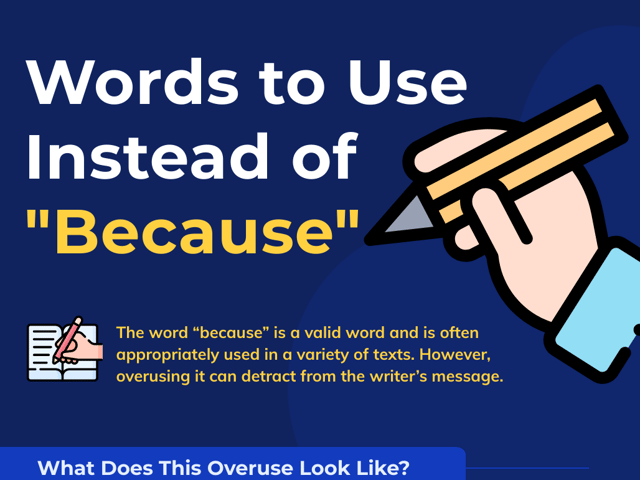
Words to Use Instead of “Because”
The word “because” is a valid word and is often appropriately used in a variety of texts. However, overusing it can detract from the writer’s message.
What Does This Overuse Look Like?
Consider this paragraph:
Because children are usually prone to behaviors that do not fit in with what adults prefer, children are often seen as being ‘too loud’ or ‘too disruptive’. Why does this happen? This happens because adults usually forget what it felt like to be as helpless and reliant on other people as children are, and because they do not want to have to take the time and provide the attention required to truly understand what it is that children need. Nevertheless, it is important for adults to tune into kids, because failing to do so can create a truly enormous rift. Parents and children, teachers and students, and even adult members of a community and the community’s children must learn to get along, because failing to get along results in a great deal of resentment and shame.
Although the paragraph above is technically correct, it is awkward and difficult to read. Why? The word because is used five times in only five sentences, an egregious overuse of the word. The word because is often seen as a cornerstone of language, and can be heard scattered throughout the language of children and adults, alike; nevertheless, there are numerous words and phrases that can effectively replace the word because in a sentence without obscuring the meaning of the sentence or damaging the sentence’s cadence.
What Are Some Replacement Words for “Because”?
To effectively replace because in a sentence, it is important to understand how the word functions in a sentence. The dictionary definition of the word is as follows: “for that reason; since.” Despite this dictionary definition, replacing because with for that reason often sounds clunky and unpleasant. One of the most effective ways to craft a sentence or paragraph without using the word because is to use all of the words at your disposal that link dependent clauses. These words and phrases include:
- as a result
- consequently
- due to
- thus
- accordingly
- hence
- as
There are others that can be cobbled together, as well, but these are the most common.
Are There Other Remedies?
Another method to reduce because repetition is to vary the length and structure of sentences. A colon or semicolon can also frequently take the place of the word because to simplify the sentence and change up the sentence structure in a paragraph.
How Do These Strategies Work?
To demonstrate these suggested remedies in action, the initial paragraph has been rewritten below with revision of words, punctuation, and sentence structures. This process has eliminated the need to use the word because altogether.
Let’s take it sentence by sentence:
Sentence 1
Original: “Because children are usually prone to behaviors that do not fit in with what adults prefer, children are often seen as being ‘too loud’ or ‘too disruptive’.”
Revised: “Children are usually prone to behaviors that do not fit in with what adults prefer; consequently, children are often seen as being ‘too loud’ or ‘too disruptive’.”
Sentence 2
Original: “Why does this happen?”
Revised: no change needed
Sentence 3
Original: “This happens because adults usually forget what it felt like to be as helpless and reliant on other people as children are, and because they do not want to have to take the time and provide the attention required to truly understand what it is that children need.”
Revised: “Adults usually forget what it felt like to be as helpless and reliant on other people as children are and, as a result, they do not want to have to take the time and provide the attention required to truly understand what it is that children need.”
Sentence 4
Original: “Nevertheless, it is important for adults to tune into kids, because failing to do so can create a truly enormous rift.”
Revised: “Nevertheless, it is important for adults to tune into kids. Failing to do so can create a truly enormous rift.”
Sentence 5
Original: “Parents and children, teachers and students, and even adult members of a community and the community’s children must learn to get along, because failing to get along results in a great deal of resentment and shame.”
Revised: “Parents and children, teachers and students, and even adult members of a community and the community’s children must learn to get along, as failing to get along results in a great deal of resentment and shame.”
Putting It All Together
The revised paragraph reads more smoothly:
“Children are usually prone to behaviors that do not fit in with what adults prefer; consequently, children are often seen as being ‘too loud’ or ‘too disruptive’. Why does this happen? Adults usually forget what it felt like to be as helpless and reliant on other people as children are and, as a result, they do not want to have to take the time and provide the attention required to truly understand what it is that children need. Nevertheless, it is important for adults to tune into kids. Failing to do so can create a truly enormous rift. Parents and children, teachers and students, and even adult members of a community and the community’s children must learn to get along, as failing to get along results in a great deal of resentment and shame.”
As you can see, “because” can frequently be eliminated without a replacement word. Even when a replacement is necessary, there are a plethora of words that can effectively take the place of “because” without changing the meaning of the sentence or damaging a paragraph’s natural rhythm.

Keep Reading

ACT Blog
Essay Writing Practice and Prompts for the ACT
The ACT writing test is an optional exam, and is not always given as pa…

ACT Blog
How to Do Well on the ACT Essay
Understanding the ACT Essay Before diving into strategies to excel, it…

ACT Blog
How to Study for the ACT in One Week
Getting ready for American College Testing (the ACT) can be a source of…